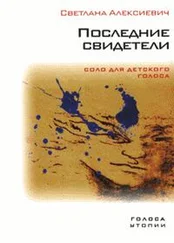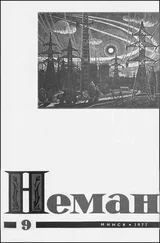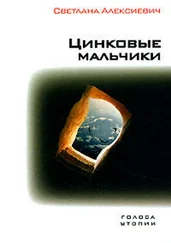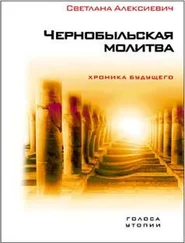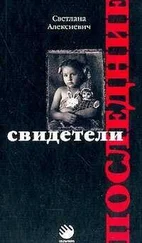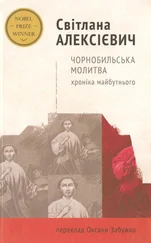Светлана Алексиевич - Chernobyl Prayer - A Chronicle of the Future
Здесь есть возможность читать онлайн «Светлана Алексиевич - Chernobyl Prayer - A Chronicle of the Future» весь текст электронной книги совершенно бесплатно (целиком полную версию без сокращений). В некоторых случаях можно слушать аудио, скачать через торрент в формате fb2 и присутствует краткое содержание. Год выпуска: 2016, ISBN: 2016, Издательство: Penguin Books Ltd, Жанр: Биографии и Мемуары, на английском языке. Описание произведения, (предисловие) а так же отзывы посетителей доступны на портале библиотеки ЛибКат.
- Название:Chernobyl Prayer: A Chronicle of the Future
- Автор:
- Издательство:Penguin Books Ltd
- Жанр:
- Год:2016
- ISBN:9780241270547
- Рейтинг книги:3 / 5. Голосов: 1
-
Избранное:Добавить в избранное
- Отзывы:
-
Ваша оценка:
- 60
- 1
- 2
- 3
- 4
- 5
Chernobyl Prayer: A Chronicle of the Future: краткое содержание, описание и аннотация
Предлагаем к чтению аннотацию, описание, краткое содержание или предисловие (зависит от того, что написал сам автор книги «Chernobyl Prayer: A Chronicle of the Future»). Если вы не нашли необходимую информацию о книге — напишите в комментариях, мы постараемся отыскать её.
Chernobyl Prayer: A Chronicle of the Future — читать онлайн бесплатно полную книгу (весь текст) целиком
Ниже представлен текст книги, разбитый по страницам. Система сохранения места последней прочитанной страницы, позволяет с удобством читать онлайн бесплатно книгу «Chernobyl Prayer: A Chronicle of the Future», без необходимости каждый раз заново искать на чём Вы остановились. Поставьте закладку, и сможете в любой момент перейти на страницу, на которой закончили чтение.
Интервал:
Закладка:

Svetlana Alexievich
CHERNOBYL PRAYER A Chronicle of the Future Translated by Anna Gunin and Arch Tait

Contents
Some historical background
A lone human voice
The author interviews herself on missing history and why Chernobyl calls our view of the world into question
1
Land of the Dead
Monologue on why people remember
Monologue on how we can talk with both the living and the dead
Monologue on a whole life written on a door
Monologue of a village on how they call the souls from heaven to weep and eat with them
Monologue on how happy a chicken would be to find a worm. And what is bubbling in the pot is also not forever
Monologue on a song without words
Three monologues on ancient fear, and on why one man stayed silent while the women spoke
Monologue on how man is crafty only in evil, but simple and open in his words of love
The Soldiers’ Choir
2
The Crown of Creation
Monologue on the old prophecies
Monologue on a moonscape
Monologue of a witness who had toothache when he saw Christ fall and cry out
Three monologues on the ‘walking ashes’ and the ‘talking dust’
Monologue on how we can’t live without Tolstoy and Chekhov
Monologue on what St Francis preached to the birds
Monologue without a title: a scream
Monologue in two voices: male and female
Monologue on how some completely unknown thing can worm its way into you
Monologue on Cartesian philosophy and on eating a radioactive sandwich with someone so as not to be ashamed
Monologue on our having long ago come down from the trees but not yet having come up with a way of making them grow into wheels
Monologue by a capped well
Monologue about longing for a role and a narrative
The Folk Choir
3
Admiring Disaster
Monologue on something we did not know: death can look so pretty
Monologue on how easy it is to return to dust
Monologue on the symbols and secrets of a great country
Monologue on the fact that terrible things in life happen unspectacularly and naturally
Monologue on the observation that a Russian always wants to believe in something
Monologue about how defenceless a small life is in a time of greatness
Monologue on physics, with which we were all once in love
Monologue on something more remote than Kolyma, Auschwitz and the Holocaust
Monologue on freedom and the wish to die an ordinary death
Monologue on a freak who is going to be loved anyway
Monologue on the need to add something to everyday life in order to understand it
Monologue on a mute soldier
Monologue on the eternal, accursed questions: ‘What is to be done?’ and ‘Who is to blame?’
Monologue of a defender of Soviet power
Monologue on how two angels took little Olenka
Monologue on the unaccountable power of one person over another
Monologue on sacrificial victims and priests
The Children’s Choir
A lone human voice
In place of an epilogue
Follow Penguin
PENGUIN MODERN CLASSICS
CHERNOBYL PRAYER
Svetlana Alexievich was born in Ivano-Frankivsk in 1948 and has spent most of her life in the Soviet Union and present-day Belarus, with prolonged periods of exile in Western Europe. She started out as a journalist and developed her own non-fiction genre which brings together a chorus of voices to describe a specific historical moment. Her first book, The Unwomanly Face of War (1985), chronicles the experience of Soviet women during the Second World War, while her second volume, Last Witnesses (1985), focuses on the same period seen through the eyes of Soviet children. They were followed by Boys in Zinc (1991), an account of the effects of war – specifically the Soviet war in Afghanistan – on soldiers, their families and society, and Chernobyl Prayer (1997), which features a series of monologues by people who were affected by the Chernobyl disaster. Her most recent book is Second-Hand Time (2013) , a chronicle of post-Soviet life. She has won numerous international awards, including the 2015 Nobel Prize in Literature for ‘her polyphonic writings, a monument to suffering and courage in our time’.
Anna Gunin’s recent translations include Oleg Pavlov’s award-winning Requiem for a Soldier (2015) and Mikail Eldin’s war memoirs The Sky Wept Fire (2012). Her translations of Pavel Bazhov’s folk tales appear in Russian Magic Tales from Pushkin to Platonov (2012), shortlisted for the 2014 Rossica Prize.
Arch Tait has translated thirty books, short stories and essays by most of today’s leading Russian writers. His translation of Anna Politkovskaya’s Putin’s Russia (2004) was awarded the inaugural PEN Literature in Translation prize in 2010. Most recently, he has translated Mikhail Gorbachev’s The New Russia (2016).
We are air: we are not earth
Merab Mamardashvili
Some historical background
Belarus … To the outside world we remain terra incognita : an obscure and uncharted region. ‘White Russia’ is roughly how the name of our country translates into English. Everybody has heard of Chernobyl, but only in connection with Ukraine and Russia. Our story is still waiting to be told.
Narodnaya Gazeta , 27 April 1996
On 26 April 1986, at 01:23 hours and 58 seconds, a series of blasts brought down Reactor No. 4 of the Chernobyl nuclear power plant, near the Belarusian border. The accident at Chernobyl was the gravest technological catastrophe of the twentieth century.
For the small country of Belarus (population ten million), it was a national disaster, despite the country not having one nuclear power station of its own. Belarus is still an agrarian land, with a predominantly rural population. During the Second World War, the Germans wiped out 619 villages on its territory along with their inhabitants. In the aftermath of Chernobyl, the country lost 485 villages and towns: seventy remain buried forever beneath the earth. During the war, one in four Belarusians was killed; today, one in five lives in the contaminated zone. That adds up to 2.1 million people, of whom 700,000 are children. Radiation is the leading cause of the country’s demographic decline. In the worst hit provinces of Gomel and Mogilyov, the mortality rate outstrips the birth rate by 20 per cent.
The Chernobyl disaster released fifty million curies (Ci) of radioactivity into the atmosphere, of which 70 per cent fell upon Belarus. Twenty-three per cent of the country’s land became contaminated with levels above 1 Ci/km 2of caesium-137. For comparison, 4.8 per cent of Ukraine’s territory was affected and 0.5 per cent of Russia’s. More than 1.8 million hectares of farmland have contamination levels of 1 Ci/km² or higher; roughly half a million hectares have strontium-90 contamination of 0.3 Ci/km² or above. Two hundred and sixty-four thousand hectares of land have been withdrawn from cultivation. Belarus is a country of forests, but a quarter of its forests and more than half the meadows in the floodplains of the Pripyat, Dnieper and Sozh rivers are located within the radioactive contamination zone.
As a result of constant exposure to low-dose radiation, every year Belarus sees a rise in the incidence of cancer, child mental retardation, neuropsychiatric disorders and genetic mutations.
Читать дальшеИнтервал:
Закладка:
Похожие книги на «Chernobyl Prayer: A Chronicle of the Future»
Представляем Вашему вниманию похожие книги на «Chernobyl Prayer: A Chronicle of the Future» списком для выбора. Мы отобрали схожую по названию и смыслу литературу в надежде предоставить читателям больше вариантов отыскать новые, интересные, ещё непрочитанные произведения.
Обсуждение, отзывы о книге «Chernobyl Prayer: A Chronicle of the Future» и просто собственные мнения читателей. Оставьте ваши комментарии, напишите, что Вы думаете о произведении, его смысле или главных героях. Укажите что конкретно понравилось, а что нет, и почему Вы так считаете.

